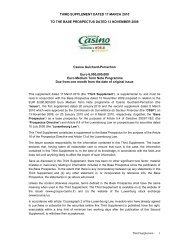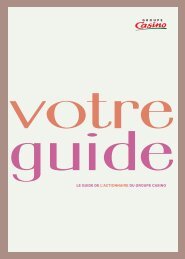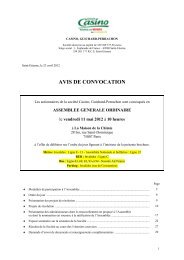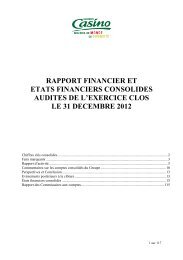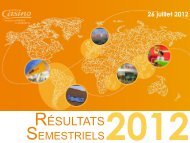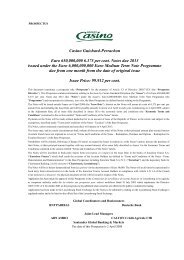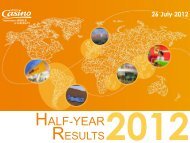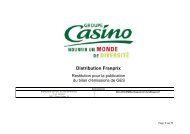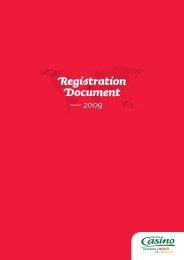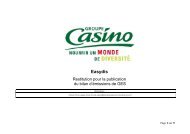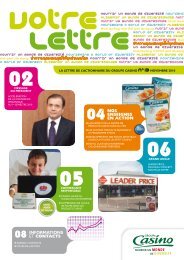2010 REGISTRATION DOCUMENT (3.4 Mo) - Groupe Casino
2010 REGISTRATION DOCUMENT (3.4 Mo) - Groupe Casino
2010 REGISTRATION DOCUMENT (3.4 Mo) - Groupe Casino
Create successful ePaper yourself
Turn your PDF publications into a flip-book with our unique Google optimized e-Paper software.
SCCR/SS/GE/13/3 Prov.page 945. The representative of the World Blind Union (WBU) expressed its appreciation for thegoodwill expressed in the SCCR to work towards language in the Treaty that would facilitate thesharing of materials across country borders. It had been encouraged by a number of commentsthat had shown understanding of that issue. The possibility of having materials in an accessibleformat would not only provide leisure reading, but the real core of education and opportunitiesfor a full and productive life to all visually impaired persons. It did not have any specific viewson the three-step test, fair dealing or fair use, but only views on the language agreed to facilitatethe practical implementation of a system that allowed the maximum access to materials by blindand visually impaired people throughout the world.46. The representative of the International Group of Scientific, Technical and MedicalPublishers (STM) called on the SCCR to create an enabling legal framework that wouldempower, rather than threaten, the ability of rights holders to serve the markets of visuallyimpaired persons and which would provide the legal infrastructure for cooperation whileencouraging public/private partnerships without undermining market access. It had alwayssupported the creation of an enabling legal framework that would allow access for print disabledpersons consistent with existing conventions which would yield effective, well crafted, crossborder mechanisms to facilitate the smooth and secure international exchange of works inaccessible formats through mainstream markets and through assistive measures. WIPO andespecially some of the Delegations from Latin America had been at the forefront of seekinggreater access for the blind and visually impaired since 1971. Fortunately, WIPO was nowclose to achieving a lasting result with a Treaty that would be enforced for many decades tocome. Fortunately, technology was also advancing fast making mainstream access for the blindand visually impaired through normal market channels also a reality. It hoped that the Treatywould lead to exponential growth of commercially available accessible works and craftedexceptions that would provide legal certainty to authorized entities, while avoiding duplicationwith other initiatives such as TIGAR, to enhance not only the accessibility of works, but thediscoverability of these works.47. The representative of the International Publishers Association (IPA) referred to the threesteptest and the issue of commercial availability. The IPA noted that it was of criticalimportance that the international exchange of copyright protected works in digital formats forvisually impaired persons would not be a white space in the international copyright framework.It was important to publishers that digital content followed the same rules of the internationallegal framework and national copyright laws. The WBU had stated that commercial availabilitywas not an important aspect of this debate however the IPA considered this was a core issue.The changes that had occurred since 2003 had to be taken into account and the trend wasclear. Namely, commercial publishing and commercial products would increasingly become theprimary direct source of accessible books for persons with print disabilities both in thedeveloped countries and in the developing countries. Commercial publishing and commercialproducts were therefore an important aspect of providing access to persons with printdisabilities. The IPA was delighted to see that recently adopted Indian copyright legislationincluded provisions regarding commercial availability referred to as ‘normal formats’. Publishersdid not want to interfere with the effective international exchange of files and commercialavailability could be worded in such a way that it would not entail any bureaucratic burden orliability. Simple mechanisms that were easy to use and which derived clear results could bespelt out. Any organization which acted in good faith should not be refrained from theinternational exchange of accessible files because of liability issues. Such organizations actingin good faith had to all be encouraged to participate in that exchange and most of them werewonderful partners for publishers to collaborate with. The new Treaty instrument had to reflectcurrent realities where publishers were part of the landscape of providing equal access tovisually impaired people at the same time, at the same place and at the same price as otherpersons.48. The representative of the International Federation of Library Associations and Institutions(IFLA) stressed that it was indispensable that exceptions in the Treaty instrument were madesubject to the three step test. The IFLA suggested that this should be reiterated in the Treaty



